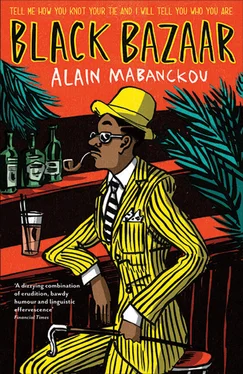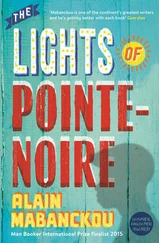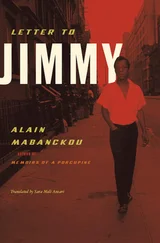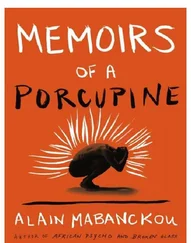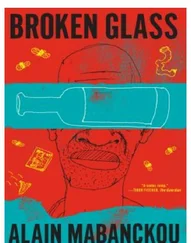“We don’t write to take our revenge, you have to master your anger and contain it so that your prose flows naturally. Deep down, I’m sure you really loved Original Colour, and you still do love her, don’t you?”
There was nothing I could say. I looked at him for a moment, this man who was so far away from his island, who had taken leave of his nearest and dearest years ago. I wondered why Haitians are either brilliant writers or taxi drivers for life in New York and Miami. And when they’re writers they are in exile. Do writers always have to live in another country, and preferably be forced to live there so that they’ve got things to write about and other people can analyse the influence of exile on their writing? Why doesn’t Louis-Philippe live in New York or Miami?
Sometimes I sing Armstrong to him, in which a famous singer from Toulouse, Claude Nougaro, has almost the same trouble as me with inspiration, except it’s about skin colour for him:
Armstrong, I am no black man
I am white of skin
When I want to sing on hope
My luck is not in
Yes, I can see the birds and the sky
But nothing, nothing glimmers on high
I am white of skin
Louis-Philippe tells me that without homesickness nothing comes out, even if you can see the restless birds in the branches. Now it just so happens that I am also far from my country, and I feel like I’m in exile, so am I going to spend my life crying about this? These Haitian writers are like hunted birds. They’ve had more than thirty-two coups d’état back home and not a country in the world has equalled this record yet. With each coup d’état, flocks of writers have emigrated. They left everything behind, setting out with nothing apart from their manuscripts and their driving licence. I wish I’d been born Haitian so I could be a writer in exile who understands the song of the migrating bird, but I don’t have any manuscripts, or a driving licence to become, in the worst-case scenario, a taxi driver in the streets of Paris …
* * *
When Louis-Philippe talks about his country, his eyes go moist with emotion. I’ve got received ideas, clichés in black and white, as well as colour snapshots too. Life there has its ups and downs. When he tells me about how their country was the first black Republic, I applaud, I feel proud as a Toussaint Louverture painted by Edouard Duval-Carrié, the most rated Haitian artist in Miami. But I stop clapping when Louis-Philippe talks to me about the Tonton Macoutes and company. Ouch, I screech, ouch, papa Duvalier and son? Uncle Aristide not at all Catholic?
I filled Louis-Philippe in on how, over in the Congo, we know a few tunes from his native country, we grew up with his music. You could hear the voice of their musician Coupé singing “Away with you” in all our bars. And when we heard “Away with you”, it meant it was dawn and the bar was about to close. But there were always those last remaining gentlemen who deliberately ignored Coupé Cloué even though he told them several times: “Away with you! Away with you! Away with you!” Coupé Cloué is a sort of Haitian Manu Dibango, the same shaved head, the same smile that reaches all the way to his ears.
I also listened to the rhythms of their group Skah Shah de New York with Jean Elie Telfort’s voice, because I’m an open-minded kind of guy after all who is thoughtful about the ways of the world. I enjoyed the song Camionnette by Claudette et Ti Pierre, and whenever I heard that summer hit it meant there was a burial or a party to mark the end of the mourning period in our neighbourhood, and sometimes even a wedding because we’re like that back home, in life and death we dance to the same rhythm for funerals, weddings, divorces and for the other joys and trials of everyday life. There is joy in pain, that’s the way it is in my small country …
* * *
I won’t easily forget how guilty I felt for not knowing how to dance the Haitian kompa properly. Not that there was anything fancy about this dance, all you had to do was grab your partner by the hips and make a compass with her, the way we used to in geometry at elementary school, that was it. Easy to say but difficult out there on the dance floor. And I admitted to Louis-Philippe that I’d had to make my excuses to the only Haitian lady in our district of Trois-Cents. This woman was stunned to see that a negro from the Congo didn’t know how to dance the kompa, even though everybody knows that all black music comes from Africa and there’s no point in teaching Africans how to dance because it comes naturally as soon as the music starts up. And this Haitian lady was called Mirabelle. She said she was going to teach me the basics. And I said great, at last I’m going to be able to dance the kompa.
Mirabelle had an enormous and very firm B-side, it was easy to grab hold of and let yourself be carried like a baby kangaroo stuffed inside its mother’s pocket.
“Hold on tight, little one,” she said to me, “or you’ll fall off when things heat up. Don’t be shy and don’t hold back. If you feel something rising up between your legs, don’t be ashamed, it’s only natural, it means you’re starting to master the kompa.”
So I squeezed her tight in order to rub myself up against her as best I could. But I was dancing the Congolese rumba and that annoyed her.
She shouted:
“The Congolese rumba isn’t the only thing in life, there’s the kompa too.”
And I answered:
“No one can learn a dance in one day …”
“Dance this kompa for me instead of talking! Squeeze me hard in the upright position, make like you’re rising up and sinking down while lightly brushing against my chest. But watch it, I don’t want you crushing my breasts!”
And then she said I had to go a bit faster than that, that I had to wrap my arms around her, and glue my face to hers. I applied myself: I was sweating, she was sweating, we were spinning, we were colliding with the other dancers, we were heading for the wall, then for a dark corner where she took the opportunity to stuff her hand between my legs and declare with a big smile:
“I see that now you have mastered the kompa! I didn’t know you could learn so quickly! There’s something growing hard between your legs …”
At least I saved face that day. But I still can’t dance the kompa properly because I always tread on the toes of my partners — especially Haitians from Pétionville …
* * *
Like me, Louis-Philippe has got a moustache. He wears glasses for being short-sighted, I don’t, which is only to be expected because he’s read more books than Roger the French-Ivorian, especially the Latin American writers. And he also maintains that a writer should wear reading glasses so people can tell he’s really working, that it’s all he does, that he sweats, because people won’t believe you’re a writer if you haven’t got reading glasses. So it’s hardly surprising if I wear clear glasses now, it makes it easier for people to imagine I’m short-sighted.
The day Louis-Philippe saw me with these glasses, he chuckled:
“It’s true I said in jest that you should wear glasses to fit with the image the general public has of a writer, but you didn’t have to go and buy the most expensive pair on Rue du Faubourg Saint-Honoré!”
When I turn up at his place, he can’t wait to show me the most recent naïve Haitian paintings he’s brought back from his island. And we talk about everything. I say bad things about Mr Hippocratic. And explain how I’d like to move out of the building that has ruined my life.
Louis-Philippe thinks that, now Original Colour is no longer there, I should try talking to Mr Hippocratic from time to time.
Читать дальше
